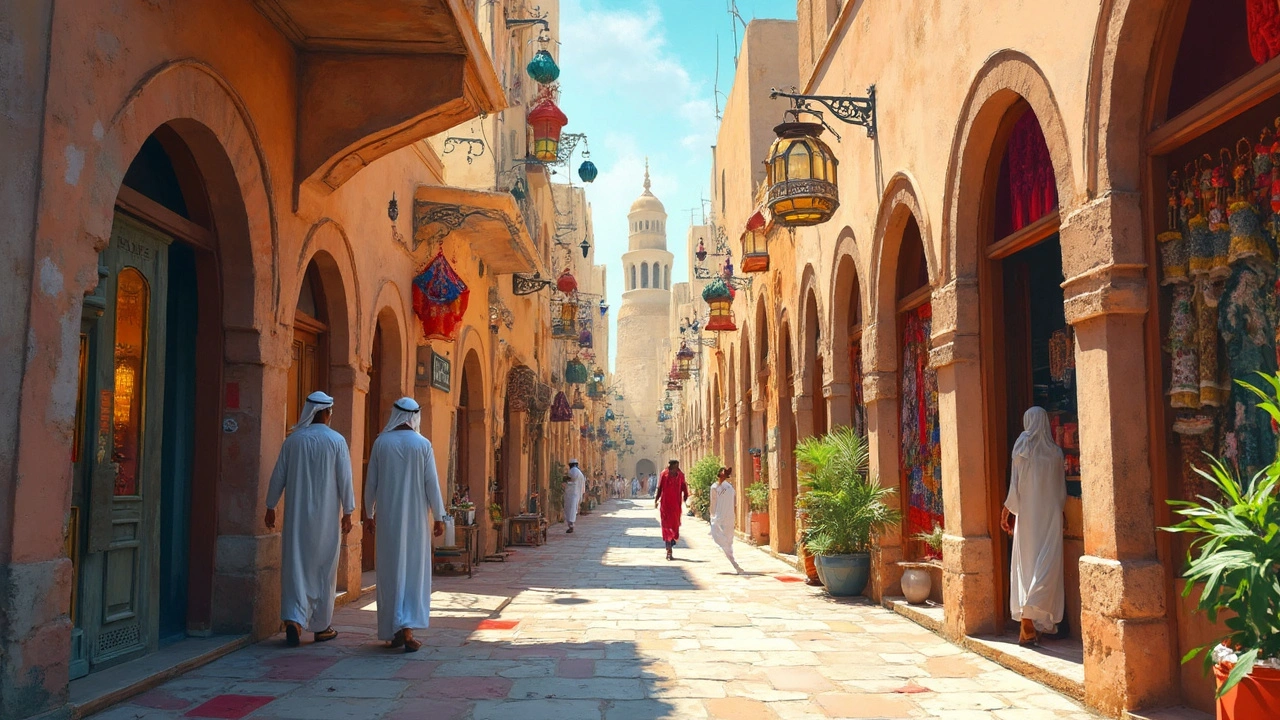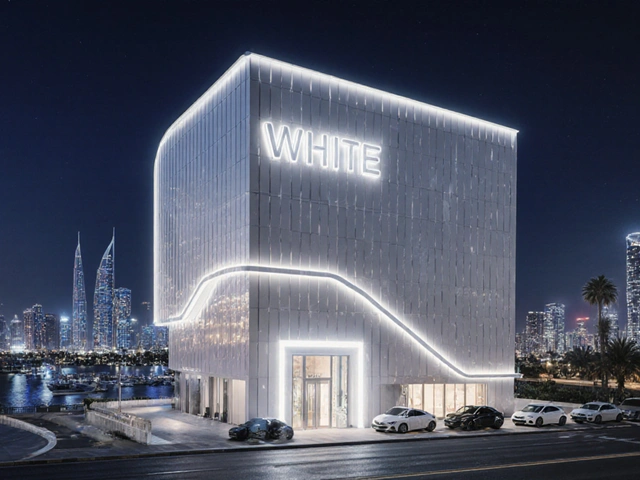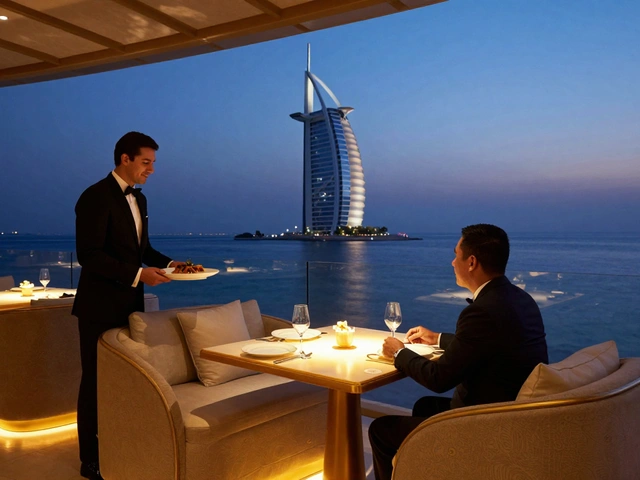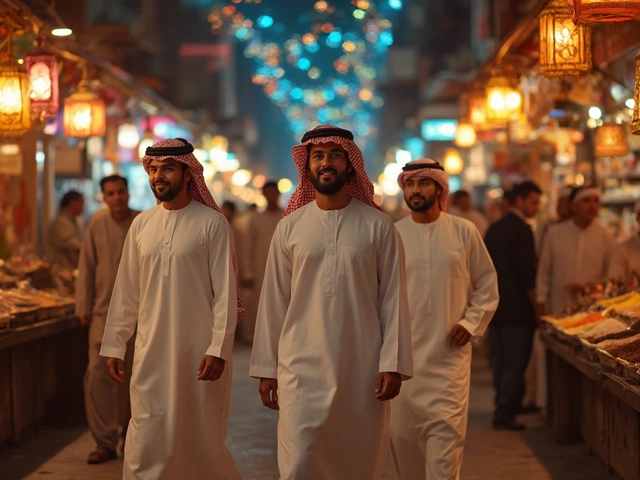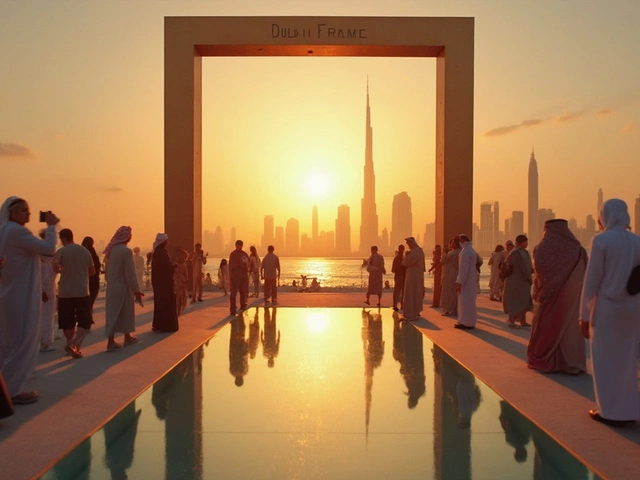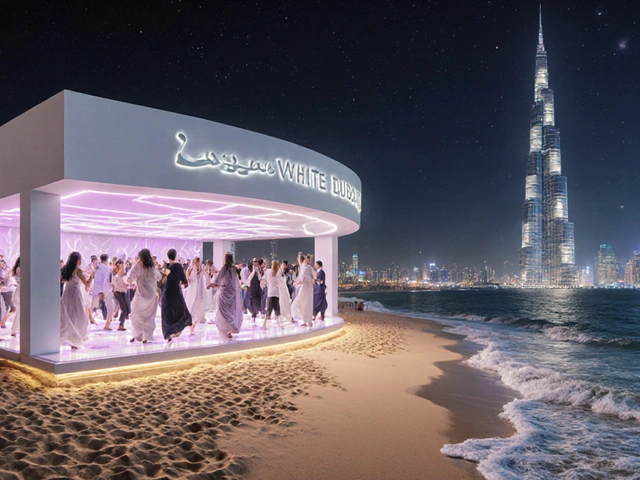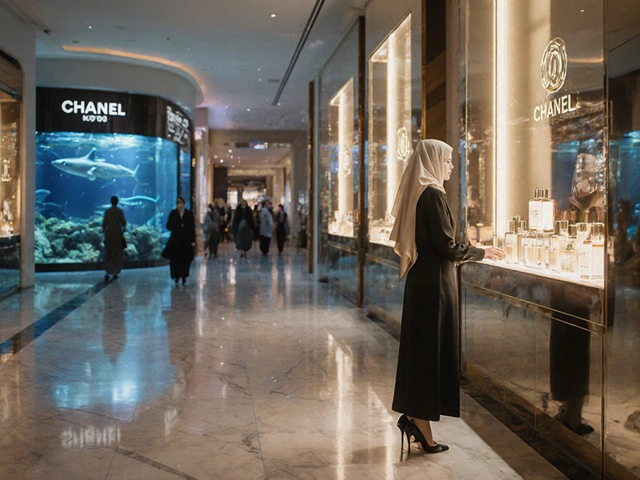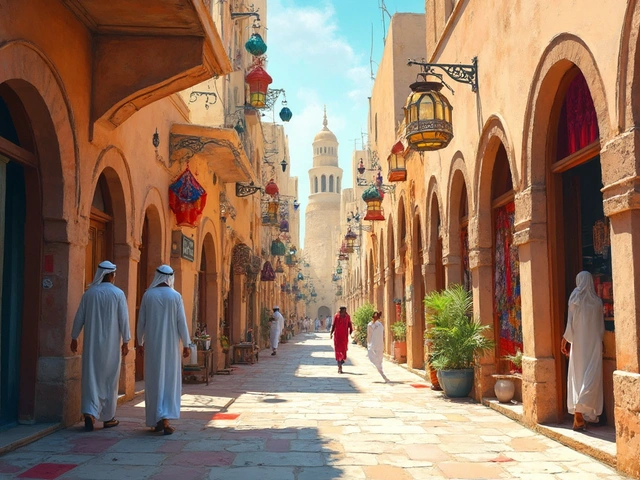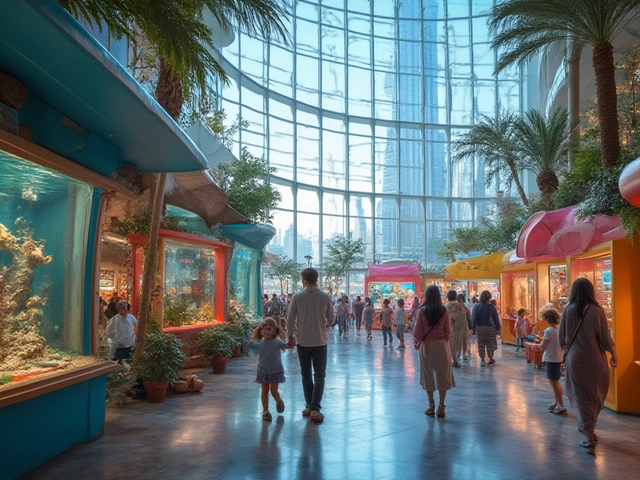Everyone in Dubai hears about the mega malls and designer shops, but let’s be real—sometimes you just want something with a little more soul. If you’re tired of the same flashy window displays in Dubai’s behemoth malls, you might like what’s hiding in the UAE’s small-town shopping corners. Think friendly chats with the shop owner, discovering handmade jewelry, and sipping chai while you browse instead of just grabbing a coffee-to-go.
Dubai’s old quarters, like Al Bastakiya, break away from the polished mall scene. Here, you’ll find tiny art shops, indie book nooks, and places that look like they jumped out of a Dubai Instagram account from 2005. Not to mention, these spaces often showcase Emirati brands that you simply won’t see in Dubai Mall or Mall of the Emirates.
If you want shisha pipes from Ras Al Khaimah, or hand-painted ceramics from Hatta, small-town markets are the way to go. Prices aren’t fixed, so there’s a chance to bargain—and let’s be honest, bargaining in the UAE’s souks is half the fun. Don’t worry about language barriers; most shopkeepers love meeting Dubai folks and will go out of their way to help. Bring cash, because not everywhere accepts cards.
- What Makes Small-Town Shopping Special in the UAE
- Hidden Shopping Spots Near Dubai
- Local Brands and Handcrafted Finds
- The Social Side: Cafes, Events, and Stories
- Bargaining and Shopping Etiquette in the Emirates
- How to Plan Your Small-Town Shopping Adventure
What Makes Small-Town Shopping Special in the UAE
Ask around in Dubai and you’ll hear the same thing—everyone’s been to Dubai Mall, most can rattle off the names of high-end fashion stores, but small-town shopping hits different. Out in the UAE’s smaller towns, there’s a vibe you just don’t get at the big chains. You’re part of a slower, friendlier shopping scene, where you’ll probably talk with the person who made what you’re buying. That’s a world away from department stores.
For starters, these shopping spots help keep local traditions alive. Walk into a textile stall in Ajman or a spice shop in Fujairah and you see crafts passed down for generations. Most goods aren’t mass-produced, which means you can actually spot the small quirks that show they’re handmade.
The other big thing? Prices. There’s usually room to bargain, and shopkeepers expect a little friendly back-and-forth. It makes shopping more interactive. You don’t just buy; you join in. Plus, you’ll find deals that’d be impossible in downtown Dubai.
People often ask what you can buy in these places that you can’t find in the city. Here’s a quick look:
- Locally woven kanduras and abayas stitched in Ras Al Khaimah
- Fragrant bukhoor and oud mixes from Sharjah’s traditional markets
- Custom-made pottery and ceramics from Hatta
- Hand-embroidered home decor and cushions from Al Ain
The social part is a bonus. Shopkeepers are usually happy to chat, share stories about their craft, and even offer you a cup of gahwa. This kind of exchange just isn’t possible in the high-speed world of the Dubai shopping scene.
If you’re wondering whether small-town shopping is popular, check out these numbers:
| Location | Typical Visitors per Week | Commonly Sourced Items |
|---|---|---|
| Ajman Souk | 2,000+ | Textiles, spices, gold |
| Hatta Market | 1,300 | Pottery, antiques, honey |
| Ras Al Khaimah Old Souk | 2,800 | Kanduras, perfumes, handmade crafts |
So, if you’re after the kind of finds nobody else will have back in Dubai, or you just like shopping somewhere quieter and more personal, the UAE’s small towns give you a whole different way to experience retail therapy.
Hidden Shopping Spots Near Dubai
Just a short drive from the city, there are unique places where shopping feels like treasure hunting. Forget mega malls—these spots offer a totally different vibe, perfect for anyone living in Dubai or just visiting.
Start with the Friday Market near Masafi. This isn't some shiny mall on Sheikh Zayed Road—it's a street lined with stalls selling fresh fruit, pottery, carpets, and even quirky souvenirs. Prices are usually much cheaper than big city shops, and vendors often cut deals if you buy a few things. The market’s set right between Fujairah and Ras Al Khaimah, so it’s easy to fit in a day trip.
In Sharjah, the Souq Al Arsah is one of the oldest markets in the UAE. It has wooden doors, cool stone floors, and tiny shops selling incense, handmade bags, and antiques. It’s almost like a step back in time—no big brands, just hidden gems. Many expats visit Souq Al Arsah for local crafts you won’t see in Dubai’s giant malls.
If you’re into organic food and handmade products, head south to The Sustainable City’s Saturday Market. It’s not just food—there are kiosks with local fashion, skincare, and fresh baked goods made by residents. Bring reusable bags, since many vendors skip plastic to keep things eco-friendly.
Here’s a quick look at these spots and how far they are from Dubai:
| Shopping Spot | Type | Distance from Dubai (km) |
|---|---|---|
| Friday Market, Masafi | Open-air stalls | 125 |
| Souq Al Arsah, Sharjah | Traditional indoor souk | 28 |
| The Sustainable City Market, Dubai | Community pop-up | 19 |
| Blue Souk (Central Market), Sharjah | Mall-style souk | 22 |
Some of these places only open on specific days or close for midday breaks, so always check timings before you go. It’s best to visit early in the morning or right after Asr prayer when the shops come alive again. If you’re hunting for the feel of Dubai shopping but want something less flashy, these small-town spots are where you’ll find real stories—and pretty good deals, too.
Local Brands and Handcrafted Finds
This is where shopping near Dubai gets interesting. If you’re after real Emirati vibes, these small-town stores and market stalls deliver way more than what you’ll spot at global chains. Across places like Al Ain, Fujairah, or Ajman, you’ll run into family-run businesses that have been selling soaps, rugs, and ceramics for decades—some even longer.
There’s a growing interest in local fashion labels. Think Dubai shopping for one-off abayas from Twisted Roots or gnarly statement sneakers by The Tasty Bakes—a funky homegrown shoe brand that started in a Sharjah studio. Want something for your home? Head to Tashkeel in Nad Al Sheba, a creative hub and shop where UAE artists sell prints and quirky décor.
If you love crafts, explore Souq Al Arsah in Sharjah, which dates back to the 18th century. Here, you’ll find baskets woven by hand, pressed date syrup from a Ras Al Khaimah co-op, and ceramic pottery unique to the northern Emirates. These aren’t made for tourists—they’re meant for everyday life, and the quality shows.
Check out this snapshot of where to hunt for originals:
- Al Bastakiya District (Dubai): Find hand-painted calligraphy, Emirati perfume oils, and knitwear by local designers.
- Sougha (Abu Dhabi): Woman-owned collective, famous for Sadu weaving. Bags here make great gifts and support rural artisans.
- Souq Al-Jum’ah (Fujairah): Wicker baskets, spices, and rare honey that locals swear by.
Handcrafted finds aren’t just pretty—they’re practical too. Many UAE-made products use natural ingredients and materials, fitting right in with eco-friendly values.
| Product Type | Popular Local Brands | Where to Buy |
|---|---|---|
| Perfume Oils | Swiss Arabian, Ajmal | Dubai Creek, Ajman Markets |
| Handwoven Baskets | Sougha, Al Ghadeer UAE Crafts | Abu Dhabi, Sharjah Souks |
| Pottery | Fujairah Pottery Makers | Fujairah, Hatta Markets |
| Bakhoor (Fragrant Wood Chips) | Khalis Oud, Yas Perfumes | Dubai Souks, Ras Al Khaimah |
Always ask for the maker’s story—you’ll walk away with a purchase that’s got some meaning behind it, not just something off a shelf. Plus, if you want custom work, most artisans here are happy to take requests. It makes gift shopping a breeze.
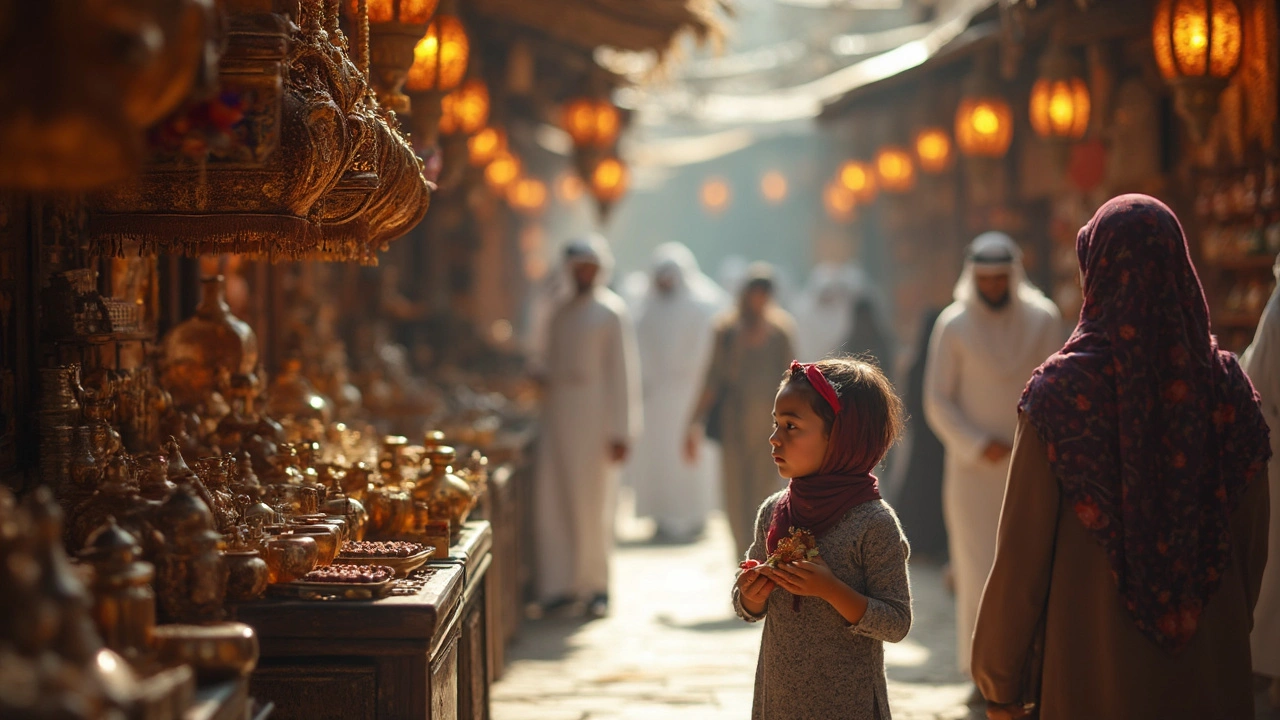
The Social Side: Cafes, Events, and Stories
The best part of small-town shopping in Dubai and the surrounding Emirates isn’t just what you buy—it’s what you experience around those hidden shops. Every little neighborhood market has its own vibe, and for locals and expats, these are where people kick back, trade stories, and make shopping a lot more memorable.
Start with the cafes. Grab a seat at the Arabian Tea House in Al Fahidi, where old wind towers shade mosaic tables. It’s a favorite for both Emirati grandmothers and Instagram influencers. The Karak House in Sharjah keeps it simple with strong, sweet tea and paratha rolls—a true comfort food pit stop while browsing crafts nearby.
Shopping events also pop up in these areas. Alserkal Avenue sets the benchmark with its art markets and pop-up stores that mix quirky UAE brands with pop culture. In Ras Al Khaimah, the Friday Souk hosts food stalls, live oud music, and henna booths. Keep an eye out for Dubai’s Ripe Market, held weekends at Police Academy Park, where you can swap stories with farmers and designers—think fresh dates and homemade jams on one side, street fashion on the other.
What kind of stories do people walk away with? It could be getting a recipe from a baker selling date maamoul, finding a pottery artist who moved from Abu Dhabi with her family, or buying handwoven baskets made in Fujairah and learning how each color represents something in Emirati culture.
- Don’t skip the notice boards in these cafes and shops. They often list workshops (like Arabic calligraphy at Alserkal) or food tastings coming soon.
- Chat with shop owners. Many love sharing how their products are made and might even invite you to community events.
- Bring your friends—it’s way more fun to compare finds over coffee than scrolling online.
| Popular Small-Town Market Events (2025) | Location | Highlight |
|---|---|---|
| Ripe Market | Dubai Police Academy Park | Organic food, handmade goods |
| Friday Souk | Ras Al Khaimah | Live music, traditional crafts |
| Alserkal Pop-Ups | Alserkal Avenue, Dubai | Artisan brands, workshops |
So when you visit these Dubai shopping spots, don’t just go for the items—go for the human moments. You won’t get personal stories or fresh-squeezed juice at a mega mall food court.
Bargaining and Shopping Etiquette in the Emirates
Bargaining isn’t just allowed in the smaller markets around Dubai—it’s expected. Whether you’re shopping for Emirati perfumes in Ajman, textiles in Sharjah, or pottery in Hatta, a little back-and-forth is all part of the fun. Most people visiting Dubai shopping hotspots like souks and roadside stands will notice prices are hardly ever fixed. Even long-time residents get a kick out of shaving a few dirhams off the price.
Locals appreciate respect and friendliness when you bargain. Coming in with a pushy attitude never works. Here’s what helps:
- Start with a smile and a greeting—"Salam Alaikum" goes a long way.
- If you can, get a feel for the prices by browsing stalls before asking for the best deal.
- Bargain politely, and never insult the product or the seller.
- If you want a lower price, ask if there’s a “good price” or “final price”—these phrases show you know the scene.
- Don’t be afraid to walk away if you think the price is too high. Sometimes that’s when the seller calls you back with an even better offer.
- Keep cash on hand. Many small shops in the old souks prefer cash to cards, and you’ll score better deals this way.
And remember, shopping etiquette isn’t just about how you handle the price. Dress modestly, especially in traditional towns or markets—it shows respect for local culture and keeps you comfortable with the weather too. Take your time browsing. It’s normal to chat with shopkeepers about their products—they’re often eager to share a story or bit of history, especially if it’s an item handcrafted in the UAE.
Check this quick snapshot of bargaining success rates in UAE markets (according to a 2024 resident survey):
| Market | Average Discount (%) |
|---|---|
| Dubai Gold Souk | 11% |
| Sharjah Central Souk | 17% |
| Ajman Souk | 15% |
| Ras Al Khaimah Old Market | 19% |
| Hatta Handicrafts Market | 20% |
Bargaining isn’t about winning—it’s about making a connection. Respect the process, have a laugh, and you’ll leave with more than just a purchase: you’ll have a story to tell back in Dubai’s city lights.
How to Plan Your Small-Town Shopping Adventure
Keen to jump into the world of small-town shops outside Dubai? It’s not as hard as you might think, but you do need to think ahead. These spots aren’t always just around the corner, and they work a bit differently from Dubai’s big malls. Here’s how you can make your day out smooth, fun, and totally worth it.
- Pick Your Target Spot: Decide which place you want to explore. Sharjah’s old souks and heritage areas, Ras Al Khaimah’s fish and craft markets, and Ajman’s Friday market are all classic examples. Hatta’s mountain shops, about 90 minutes’ drive from downtown Dubai, are famous for local honey and pottery.
- Check Opening Hours: Unlike Dubai malls that stay open late, small-town markets often open from morning until mid-afternoon, then close during the hottest hours, reopening in the evening. Fridays run slow before 4pm; plan around Jumu’ah prayer times.
- Bring Cash: Most stalls and local shops only accept cash—dirhams, not foreign currency. Hit the ATM before you leave the city.
- Use Google Maps and Waze: Not all these spots show up with perfect pins, and parking can be tight on weekends. Type the name in English and Arabic for best results.
- Dress for Comfort: Souks and market streets get hot and dusty. Wearing smart casual is fine, but skip heels or fancy stuff. Comfortable shoes let you wander around easily. For places like mosques or old souks, make sure your knees and shoulders are covered out of respect.
If you crave a break, many small towns, like Dibba or Al Dhaid, have cozy family-run cafes, where the karak tea costs a fraction of Dubai’s prices. These spots don’t just offer things to buy—they’re a peek into real UAE life. Most importantly, don’t rush. Soak in the conversations, ask about a product’s story, and you might walk away with more than a souvenir. You’ll get a memory worth way more than a shopping bag from any Dubai shopping mall.

